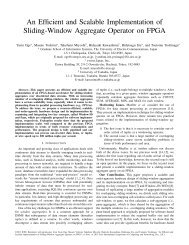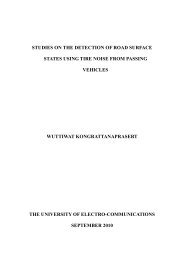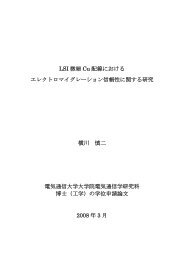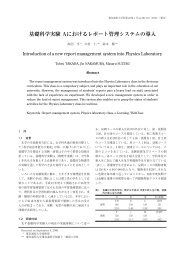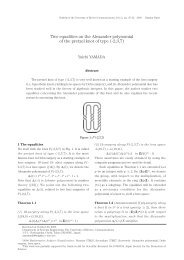Approximation of Hessian Matrix for Second-order SPSA Algorithm ...
Approximation of Hessian Matrix for Second-order SPSA Algorithm ...
Approximation of Hessian Matrix for Second-order SPSA Algorithm ...
Create successful ePaper yourself
Turn your PDF publications into a flip-book with our unique Google optimized e-Paper software.
<strong>Approximation</strong> <strong>of</strong> <strong>Hessian</strong> <strong>Matrix</strong> <strong>for</strong><br />
<strong>Second</strong>-<strong>order</strong> <strong>SPSA</strong> <strong>Algorithm</strong> Addressed<br />
Toward Parameter Optimization<br />
in Non-linear Systems<br />
Jorge Ivan Medina Martinez<br />
Abstract<br />
The research presented in this dissertation has been motivated due to the fact that many<br />
algorithms, which are very extended, do not <strong>of</strong>fer sufficient stability in the estimation <strong>of</strong> a great<br />
volume <strong>of</strong> parameters in non-linear systems or other kinds <strong>of</strong> systems. They also have a high<br />
computational complexity and cost. So that, we have decided to use the simultaneous<br />
perturbation stochastic approximation (<strong>SPSA</strong>) algorithm because it has several important<br />
advantages such as low computational complexity and stable convergence. Nevertheless, the<br />
typical <strong>SPSA</strong> algorithm has some difficulties and problems when it is applied to non-linear and<br />
complex systems. There<strong>for</strong>e, this research proposes a novel extension to the <strong>SPSA</strong> algorithm<br />
based on features and disadvantages shown in the first-<strong>order</strong> and second-<strong>order</strong> <strong>SPSA</strong> (the<br />
1st-<strong>SPSA</strong> and 2nd-<strong>SPSA</strong>) algorithms and comparisons made from the perspective <strong>of</strong> the<br />
<strong>Hessian</strong> loss function. These comparisons are made because at finite iterations, the convergence<br />
rate depends on matrix conditioning <strong>of</strong> the loss function <strong>Hessian</strong>. It is shown that 2nd-<strong>SPSA</strong><br />
converges more slowly <strong>for</strong> a loss function with an ill-conditioned <strong>Hessian</strong> than the one with a<br />
well-conditioned <strong>Hessian</strong>. On the other hand, the convergence rate <strong>of</strong> 1st-<strong>SPSA</strong> is less sensitive<br />
to the matrix conditioning <strong>of</strong> loss function <strong>Hessian</strong>.<br />
The main disadvantages in the 1st-<strong>SPSA</strong> and 2nd-<strong>SPSA</strong> algorithms, one that the error <strong>for</strong> the<br />
loss function with an ill-conditioned <strong>Hessian</strong> is greater than the one with a well-conditioned<br />
<strong>Hessian</strong>. Our proposed modified version <strong>of</strong> 2nd-<strong>SPSA</strong> (M2-<strong>SPSA</strong>) eliminates the error<br />
amplification caused by the inversion <strong>of</strong> an ill-conditioned <strong>Hessian</strong> at finite iterations, which<br />
leads to significant improvements in its convergence rate in problems with an ill-conditioned<br />
<strong>Hessian</strong> matrix and complex systems. Asymptotically, the efficiency analysis shows that our<br />
proposed <strong>SPSA</strong> is also superior to 2nd-<strong>SPSA</strong> in terms <strong>of</strong> its convergence rate coefficients. It is<br />
iii



